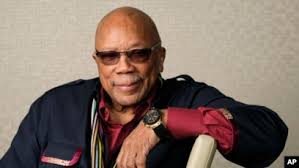Quincy Jones, the iconic music producer, jazz musician, and cultural figure whose career spanned more than seventy years, has passed away at 91. He played a crucial role in shaping modern music, collaborating with a diverse range of artists and producing some of the most significant albums of the 20th century, including Michael Jackson’s Thriller, which remains the best-selling album of all time.
His publicist, Arnold Robinson, confirmed the news in a statement, although the cause of death has not been revealed. This announcement signifies the end of an era for an artist whose remarkable talent transcended genres, cultures, and generations.
A Career Across the Spectrum of Music
Born in 1933 on Chicago’s South Side, Quincy Delight Jones Jr. developed a love for music early on, discovering the piano at a local recreation center. As a teenager, he formed a close friendship with Ray Charles, leading to a lifelong bond and musical collaboration that would influence both of their careers. Jones’ exceptional skills took him to the esteemed Berklee College of Music in Massachusetts, after which he joined Lionel Hampton’s band and moved to New York City, quickly establishing himself as a sought-after arranger.
Jones built a remarkable reputation by collaborating with some of the greatest jazz artists, including Duke Ellington, Dinah Washington, Count Basie, and his close friend Ray Charles. His keen musical ear and vision took him to Paris in 1957, where he further refined his skills under the guidance of the esteemed composer Nadia Boulanger. This experience set the stage for Jones’ illustrious career in Hollywood, where he composed for both films and television.
A Groundbreaking Figure in the Music Industry
Quincy Jones’ career was marked by numerous groundbreaking achievements. In 1967, he made history as the first Black composer nominated for an Oscar in the original song category for the film Banning. This was just the start of his legacy as a pioneer; over the years, he garnered an incredible 28 Grammy Awards from 80 nominations, solidifying his status as one of the most celebrated figures in music history.
Beyond his musical endeavors, Jones explored various ventures, establishing his own record label, launching Vibe magazine, and producing the iconic television series The Fresh Prince of Bel-Air, which propelled actor Will Smith to fame. His talent for recognizing potential and nurturing talent extended well beyond the studio, significantly shaping the landscape of popular culture.
Producing ‘Off the Wall,’ ‘Thriller,’ and ‘Bad’
Jones is perhaps best known for his collaborations with Michael Jackson, especially on the albums Off the Wall (1979), Thriller (1982), and Bad (1987). Each of these albums achieved monumental success, with Thriller reaching record-breaking global sales and transforming the music industry. Jones’ innovative production on these projects helped forge a distinctive blend of pop, funk, soul, and rock that became Jackson’s hallmark sound. Jazz legend Herbie Hancock once remarked about Jones, “He is fearless. If you want Quincy to do something, you tell him that he can’t do it. And, of course, he will – he’ll do it.”
A Legacy Beyond Music
Quincy Jones was not only a musical genius but also a dedicated humanitarian who used his platform to advocate for social change. He was instrumental in organizing the 1985 charity single “We Are the World,” which raised millions to combat famine in Africa. His unwavering commitment to global issues solidified his legacy as a figure who went beyond the music industry to make a significant impact on the world.
Remembering an Icon
Quincy Jones leaves behind an extraordinary legacy, not only through his collaborations with artists like Frank Sinatra, Count Basie, Ella Fitzgerald, and Michael Jackson but also as a mentor, innovator, and cultural ambassador. His pioneering spirit and remarkable versatility inspired countless musicians and reshaped the global musical landscape. For both fans and artists, Quincy Jones’ influence will echo for generations, ensuring he remains an irreplaceable figure in the history of music.





